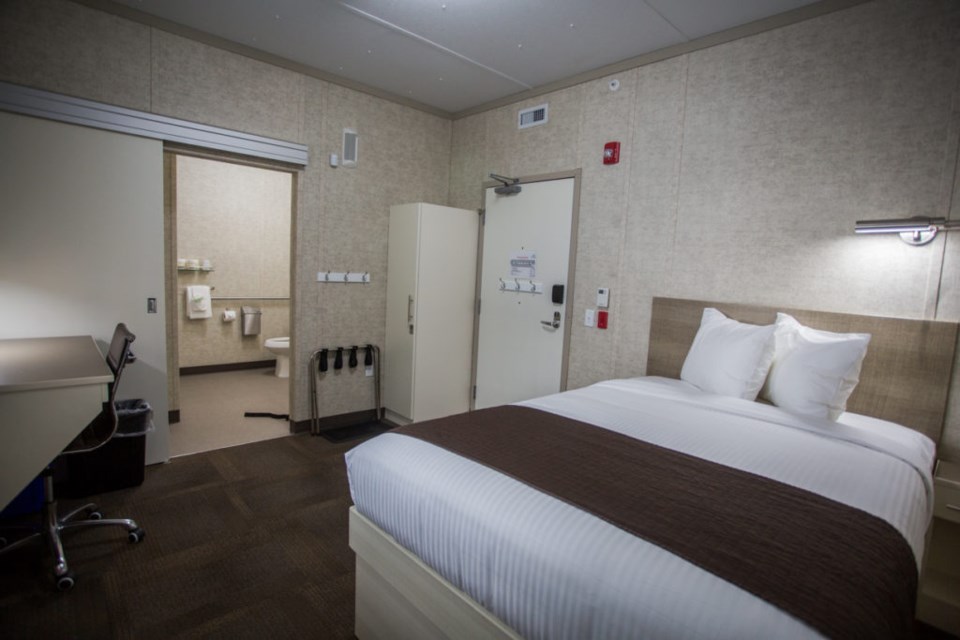One of the least-appreciated but most interesting aspects of Site C might best be discussed over a beer.
The site’s camp has attracted some attention as nicer than the last hotel you stayed in, with services ranging from a movie theatre, to general store, to hair salons – and yes, a bar.
This last amenity was a matter of some debate.
“It was definitely the city’s idea – we pushed for it,” says Fort St. John mayor Lori Ackerman.
BC Hydro is a little more bureaucratic.
“BC Hydro collaborated with the City of Fort St. John, Peace River Regional District, Northern Health and the North Peace Division of Family Practice to seek feedback about our proposed approach for the managed lounge in 2015,” says Greg Alexis, BC Hydro’s Manager of Public Affairs for Site C.

Regardless of whose idea it was, the River’s Bend Lounge exists, and the point is it’s unusual: most work camps are “dry.” That is, they not only don’t have bars, but forbid all consumption of alcohol onsite.
Ackerman describes the typical experience at a dry camp: guy wants a beer, takes his truck with a friend to the nearest liquor store – which might be very far away, and picks up a case of beer, because why would you drive all that way for just one beer?
“It's got to be drank before they go back to camp. Because [it’s not allowed] and because at 40 below outside, it's gonna freeze,” says Ackerman.
In other words, you’re practically incentivizing unsafe behaviour and binge drinking.
“The goal is mental wellness, not abstinence,” says Dr. Jong Kim, the Northeast Medical Officer for Northern Health.
“Offering this type of on-site amenity can also be safer for neighboring communities when the need for workers to leave the site to obtain or consume alcohol, and potentially drinking and driving, is reduced.”
The Lounge itself looks like an upmarket sports bar – albeit one that’s only open from 5pm to 9:30 pm, that serves beer and wine only, with a maximum of four drinks per day.
To be clear, Site C employees don’t have to drink there – though they can’t drink anywhere else in the camp. But if they want, they can head into Fort St. John.
“We also offer a shuttle between the worker accommodation and Fort St. John to provide a safe and reliable method of transportation, also mitigating potential drinking and driving incidents,” says Alexis.
Ackerman says that’s a good thing – but thinks the onsite bar is just more realistic.
“If you're working a 10 or a 12 hour shift, and want to have a beer while playing pool with your buddies, are you going to jump in the shuttle, come all the way into town for [one] beer – and then go back out?”
There are several advantages to what Dr. Kim calls the “damp camp” (as opposed to dry camp) model.
“A ‘damp camp’ model can better reflect the complexity of substance use when combined with education resources and inclusive policies at work,” says Dr. Kim.
“What you're doing by having a dry camp is pushing your social issues outside the chain link fence, and then the municipalities and the local governments have to deal with it,” says Ackerman.
It’s also about making sure those employees who can’t stop at a beer or two get the help they need.
“It helps to identify those who maybe have addictions and don't realize it. So when you've got medical staff there and there is a pub there, they can identify any addictive behavior,” says Ackerman.
Northern Health agrees.
“Prohibition & punishment increases risk by stigmatizing and fostering misunderstanding,” says Dr. Kim, “Offering this type of on-site amenity can also be safer for neighboring communities when the need for workers to leave the site to obtain or consume alcohol, and potentially drinking and driving, is reduced.”
Or, as Lori Ackerman puts it:
“To have a beer is not illegal. To have a beer while you’re driving is illegal.”
The best policies prevent the second without clutching their pearls over the first. No matter whose idea it was, BC Hydro deserves credit for making it happen.
Maclean Kay is Editor-in-Chief of The Orca
SWIM ON:
- Elizabeth May's "Mission Possible" is quite impossible without more projects like Site C, says Blair King.
- Ada Slivinski was less than impressed with BC Hydro's policy of turning beachgoers away from half-full parking lots.
- It's not all megaprojects: Bob Price looked at BC Hydro ventures generating optimism in the Nicola Valley.


